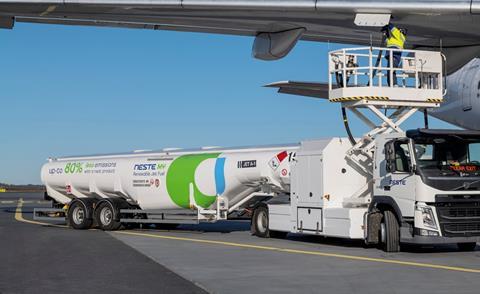A 20-member international advisory panel has submitted a list of recommendations to the Singapore government on decarbonising the aviation sector and building up a sustainable air hub.
In all, the panel – which includes key players like Boeing, Airbus, Singapore Airlines and IATA – put forth 15 recommendations, spanning three key areas: airlines, airports, and air traffic management.

For airlines, the panel suggests five initiatives, with a large focus on sustainable aviation fuel (SAF), and a longer-term goal of adopting new aviation technologies.
The panel recommends the creation of “an entire ecosystem” to make the take-up of SAF “viable”, as well as setting up a corporate “buyers’ club” to stimulate demand.
For airports, the panel puts forward six suggestions, most of which target the need to switch to renewable energy – such as solar power – as well as to improve energy efficiency in areas like air conditioning.
As for air traffic management, four short- and medium-term initiatives aim to “optimise air traffic management procedures and advance new concepts of operations” to increase efficiency and reduce emissions.
Apart from the 15 recommendations, the panel also urges the development of four “critical enablers” – policy and regulation, industry development, infrastructure planning and provision, as well as workforce transformation – which it believes will “provide the right conditions for the effective implementation” of its suggested initiatives.
Singapore’s civil aviation regulator has accepted the recommendations and is studying how best to bring them to life, as it develops a sustainability blueprint that will detail targets for the sector in 2030 and 2050.
The report submission marks the culmination of the advisory panel’s work, after it was formed in February 2022, on the sidelines of the Singapore air show.
Since then, it has held four meetings, as well as a series of discussions with over 120 representatives from 40 local and international aviation organisations.
“The [panel] believes that Singapore is well-positioned to play an important role as a pathfinder and convenor for the cross-sectoral collaboration and public-private partnership needed to reconfigure the aviation ecosystem to support sustainable operations and make it a commercially viable reality,” it states.
RECOMMENDATIONS OF THE INTERNATIONAL ADVISORY PANEL ON SUSTAINABLE AIR HUB
For airports
- Deploy solar power on the airfield
- Secure and increase the use of renewable electricity
- Improve building energy efficiency by reducing the air conditioning carbon footprint
- Facilitate transition of airside vehicles towards clean energy sources
- Explore system optimisation with a digital twin project
- Enhance resource circularity through an on-site waste-to-energy facility
For airlines
- Develop and implement a roadmap to create a long-term secured SAF supply ecosystem.
- Establish a “Singapore / Asean Corporate Buyers’ Club” to create demand signals
- Design and introduce a structural offtake mechanism and create demand signals for secured long-term, lower-cost SAF supply
- Innovate to build deep aviation industry vertical offerings in carbon markets, develop a support ecosystem for aviation carbon offsets solutions and encourage uptake among corporates and consumers
- Explore a potential technical centre for capability-building to ensure that Singapore can be an early adopter of aircraft technology, including with hydrogen
For air traffic management
- Implement advanced demand-capacity balancing
- Enhance performance-based navigation
- Optimise gate-to-gate trajectory
- Implement trajectory-based operations and free route airspace in collaboration with stakeholders and partner air navigation service providers


























